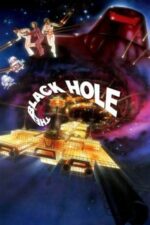A black hole, that ever-enigmatic celestial entity, has long captivated our imagination and curiosity. Whether viewed as a symbol of the universe's infinite mysteries or an embodiment of our own mortality, these cosmic phenomena have inspired countless works of art and literature, including several films that delve into their chilling depths.
Let's start with "The Black Hole" (1979), a thrilling sci-fi adventure that found Disney dipping its toe into the darker waters of outer space. The film follows a crew of intrepid astronauts who stumble upon another spaceship in close proximity to a black hole - a discovery that quickly spirals from excitement to horror as they uncover Dr. Hans Reinhardt's sinister agenda. As the crew races against time to escape the clutches of their malevolent captor, "The Black Hole" masterfully explores themes of ambition, isolation, and our eternal quest for connection amidst the cold expanse of space.
In a more contemplative vein, we have "Black Holes: The Edge of All We Know" (2016), an enthralling documentary that delves deep into the science behind these cosmic enigmas. It takes us through the groundbreaking efforts to capture the first-ever image of a black hole, as well as Stephen Hawking's work on predicting behavior within their gravitational pull. By weaving together global observatories with expressive animation, this film creates an immersive journey through scientific discovery and philosophical pondering about the nature of existence.
If you prefer your cosmic horrors served up with a side of psychological terror, look no further than "Event Horizon" (1997). Set in 2047, this sci-fi thriller sees a team of astronauts tasked with locating and salvaging the lost starship Event Horizon. Upon boarding, they discover an inexplicable force that has twisted space and time itself, leading to horrifying hallucinations and nightmarish visions. As they struggle to uncover the truth behind the ship's eerie presence, they find themselves pursued by a malevolent entity intent on their destruction.
In "Wristcutters: A Love Story" (2006), black holes take on a decidedly more metaphorical form. The film follows Zia, a man driven to suicide after the end of a heartbreaking relationship. In this dreary afterlife that mirrors Earth but suffers from decay, he learns that his ex-girlfriend has also taken her life. Fueled by determination and hope for closure, Zia embarks on a haunting journey across this frayed reality to find her and unravel the mysteries surrounding their shared fate. Here, black holes symbolize not just the void of outer space but also the profound emptiness within ourselves that can lead us to despair and beyond.
Lastly, we mustn't forget Stephen Hawking himself, whose extraordinary life is chronicled in the documentary "A Brief History of Time" (1991). Despite being physically confined by ALS, Hawking's intellect and passion for science remained unshackled, leading him to make groundbreaking contributions to our understanding of black holes and the universe itself. This film serves not only as a testament to his scientific accomplishments but also an inspiring portrayal of resilience, determination, and humanity in the face of adversity.
From the chilling depths of outer space to the profound void within ourselves, black holes have proven to be fertile ground for filmmakers seeking to explore the unknown. These celestial vortices continue to inspire us with their infinite mysteries and challenge our understanding of existence itself. So next time you gaze up at the night sky, remember that beneath those twinkling stars may lie vast realms yet undiscovered - ready to draw us into their gravitational pull.






























